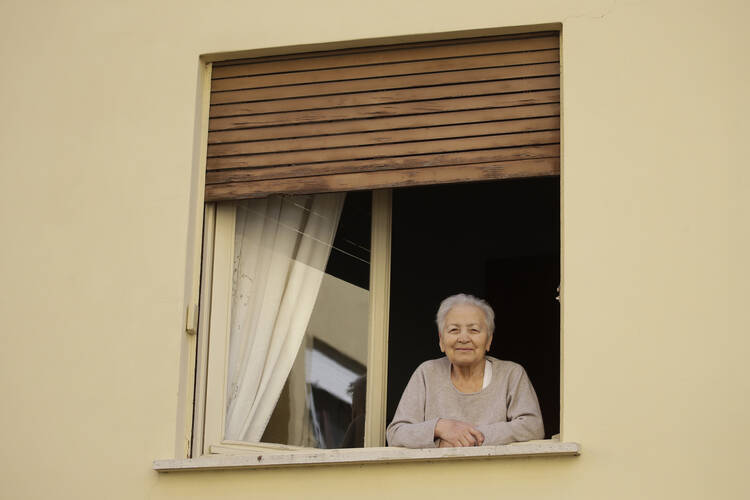Some people are hoarding hand sanitizer in response to the Covid-19 pandemic. Some people are making wills, and some people are slowly retreating into nail-gnawing panic. My husband went and found a handbell.
This is because the new coronavirus, along with all its deprivations and terrors, has given my family something rare and wonderful: Everyone is home together at noon every day. That means we can say the Angelus. And if you are going to say the Angelus, you need a nice, loud bell to ring—especially when you have college kids home who think of noon as early morning.
I am not trying to make light of the pandemic. I spent part of my morning tumbling into a spiral of fear, telling myself a bleak story about my family’s wonky immune systems and the shortage of hospital beds. I have two elderly parents with underlying health conditions and friends whose livelihoods and mental health are in serious peril. Maybe worst of all, I see people saying you are only afraid if you lack faith in God. As if Jesus himself never felt fear when there was reason to fear.
God bless my husband, he went and found a bell to ring. Sometimes we have to halt what we are doing and forcibly remind ourselves that isolation does not have to mean we are forsaken. When we say the Angelus, we remember that God did not abandon mankind. He sent an angel to Mary, and Mary gave a savior to us. So we are making an intentional effort to keep sight of that, when it is so easy to slide into terror and distress. We are not abandoned.
Sometimes we have to halt what we are doing and forcibly remind ourselves that isolation does not have to mean we are forsaken.
Let me share a few things that brought me up short in the last few days and reminded me how much good there is in the world.
People are helping each other. At-home parents are taking in the kids of working parents; people are dropping off casseroles on the porches of neighbors under quarantine; food trucks and restaurants are delivering free food to kids locked out of school lunch programs. People are using social media to make matches between those who can get around and those who cannot, so no one is abandoned. Many power and water companies are suspending shut-off notices; landlords are forbearing on collecting rent, while their tenants scrape by without wages; apartment houses are offering free lodging to students left stranded when their universities abruptly closed; some internet providers are offering free service so everyone can stay connected; basketball players are donating portions of the salary to pay the wages of arena workers whose work has been halted; people are scouting out hard-to-find foods for friends with restrictive diets. I have even seen private citizens offer to help pay the rent for strangers, simply because there is a need.
[Don’t miss more stories like this one. Sign up for our newsletter.]
And people are offering less obvious kinds of aid to each other. Some are practical, like in Italy, where an overburdened hospital ran out of valves for its I.C.U. respirators, so a local company stepped up and brought a 3D printer into the hospital, where they quickly designed and printed new valves and got people breathing again. Just like that.
And there are less practical, less concrete kinds of sharing going on, which nonetheless bring aid to desperate people. By now you must have seen the videos of numerous Italians leaning out their balcony windows, sending their hearts and voices into the outside air even as their bodies are confined to the home. I should not be surprised at how many Italians seem to have household tambourines, but I am still impressed. I found it especially endearing that one Italian neighborhood chose to sing “Volare” and, despite being Italian, they sounded terrible, just terrible! They were nice and loud, though. And do not miss the moment when the tenor belting out “Nessun Dorma” picks up his young child, who, with the honesty of childhood, promptly covers his ears.
The crisis is so overwhelming and so multifaceted, there is no one who can solve it; but people are sharing whatever it is they do have.
I cannot remember the last time I saw so many people making music together, and it is good.
Sometimes what people have to offer is experience. One friend, who had to quarantine herself a few years ago when chemotherapy destroyed her immune system, reminded everyone that cozy clothes can be comfortable but can also drag us down, so it helps a lot to get dressed every day. Other friends with chronic struggles with anxiety and depression are reminding each other that there is nothing shameful in being afraid. There is reason to fear. But getting moving and getting fresh air can help us take charge of our bodies’ response to that fear.
Of course, Catholics are stepping forward with spiritual help. Priests around the country, trying to avoid the contagion that comes with crowds gathering, are hearing confessions outdoors in parking lots. St. Damien of Molokai could not find a priest who was brave enough to set foot on the leper colony there, so he had to stand on the shore and shout his sins to a priest sitting in a boat. But some of our priests will park themselves on a folding chair and all the penitent has to do is pull up between the orange pylons and roll down the window.
Possibly my favorite example of a priest stepping up is one Orthodox priest in Virginia who, mindful of his flock who could not make it to Divine Liturgy, did what so many priests and ministers are doing: He broadcast the service via Facebook Live. But he had never used the program before, and somehow a filter got turned on without his knowledge and—well, click for yourself and see the screenshots. I think he lost custody of his eyes for a bit.
It is good to know that people are still people, still willing to visit each other, still willing to bring hope, still willing to share what they have.
I keep coming back to this and laughing my head off. Best of all, he chose one of the screenshots as a profile picture. Why this story, of all things, should restore my hope and sense of perspective, I cannot say. But that is what happened.
The crisis is so overwhelming and so multifaceted, there is no one who can solve it; but people are sharing whatever it is they do have.
Homeschoolers everywhere, who are fully used to having their kids at home all day, are sharing tips on how to homeschool temporarily—practical, real-life advice and encouragement for how to find some unexpected joys when you have to do your best while you don’t really know what you are doing.
I could go on. There is so much good, so much generosity, so much kindness. So many people are giving what they have. It is a relief to receive food, child care, a little cash, a delivery of diapers. But it is good to know that people are still people, still willing to visit each other, still willing to bring hope, still willing to share what they have.
So let us go get a bell and ring it every day. Ring it for other people. Amplify the good you have and the good you know about. And ring it for yourself. The isolation will not last forever. There is so much good in the world. We have not been abandoned.
[Explore all of America’s in-depth coverage of the coronavirus pandemic]










